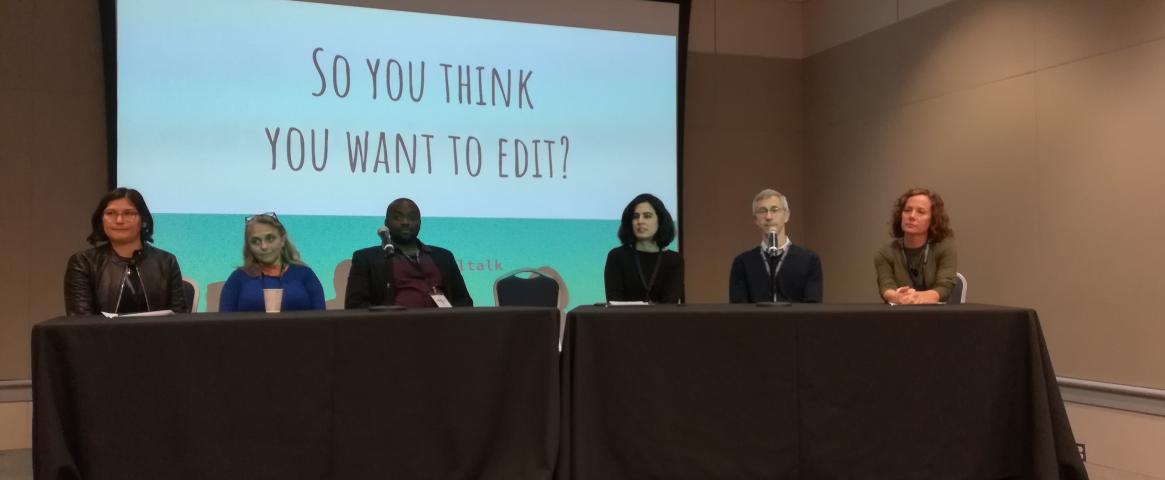By Myriam Vidal
Maya Wei-Haas pressed the publish button and the article "Researchers spot super colony of Adélie penguins from space" was free for the world to see in the National Geographic platform. She now could move on with the next assignment except that, just a few minutes later, the replies started rushing in. "Penguins from space, penguins from space", everybody kept saying on the social networks.
The work of an editor can be terrifying sometimes, so it's not a surprise that a lot of writers hesitate to make the leap into it. That's why, in this year's ScienceWriters conference, the organizers invited editors from all sorts of backgrounds and media like National Geographic, Nature, and PBS News Hour among others to the panel "So you think you want to edit?" so they could talk with those who are starting at the job or doubting whether they are right for it.
The result was a rich discussion in a round-table format, where everyone at the room chose to talk to the editor that personified best his or her concerns. At the end of it, everybody shared notes, which will be posted in the Facebook group Science Editing Real Talk, in case anyone wants to take a look and give continuity to the discussion.
Let's start from the beginning. Do you want to edit?
"If people are writers who love nothing more than getting a great idea, and follow that wherever it goes, and spend weeks immersed in that story, you should be a writer. If you like to have a lot of things going at once, you don't want to spend six weeks learning about something, you might be good at being at editing", said Catherine Pierre, director of communications at Johns Hopkins University.
In case you're part of the second group, or you're just editing because life's ongoing circumstances put you in that position, and are scared, remind yourself that every great editor came to be that by constant practice, reading other stories and breaking them down in patterns and structures, analyzing how they flow and why they work, and asking for some guidance that can come either from books or from a mentor. Above all, it's important to remember that an editor is just another reader.
As Tim Appenzeller, news editor from Science, put it, his approach to any story comes from a gut feeling. "I read a story first without editing or top editing, without making any changes, just read it and see how I feel afterwards. Was I bored? Am I dissatisfied? Was it something really interesting and I just didn't get it? Was I frustrated? How do I feel about this story? And then I try to analyze smarter actions to figure out what it is about the story that's causing me to feel that way … I'm just a sympathetic reader who really wants to understand your story."
However, it can get tricky sometimes and lead to frustration for the editor who's not getting the story that he had in mind and the writer who receives the feedback. But, as Karen Kreeger, science writer at the University of Pennsylvania said, writers shouldn't take it personally. After all, the editor is just trying to make them the best.
A healthy communication between the writer and the editor is important, one in which the editor doesn't just rewrite the work and focus on the bad, but instead gives strong feedback starting with something positive, remembering what it felt like to be on the other side where you're facing a blank page terrified by the deadline and doing your best to convey the idea in a creative and fresh way.
In the end, as Maya Wei-Haas explained, editors are human and mistakes are bound to happen, but fear shouldn't stop anyone from pursuing the editing path. "Occasionally space penguins happen and it's OK."




